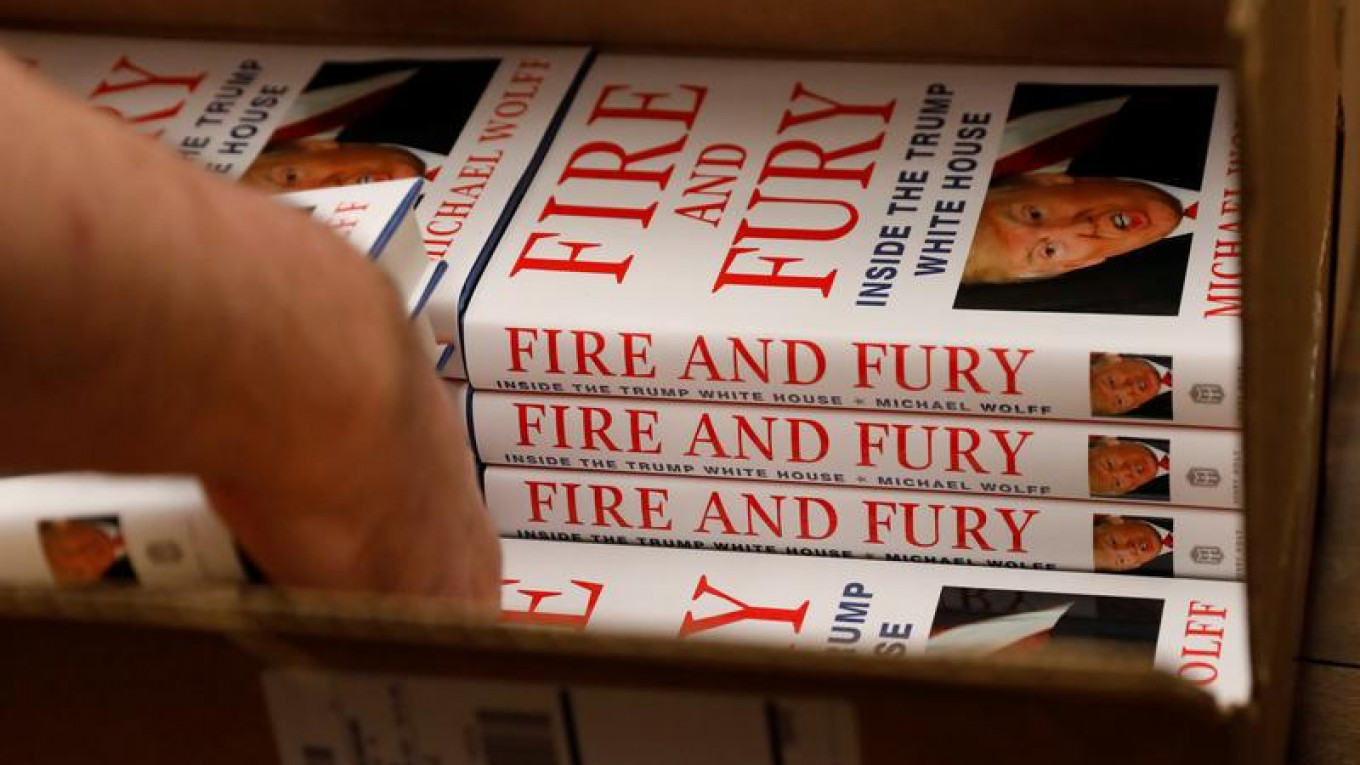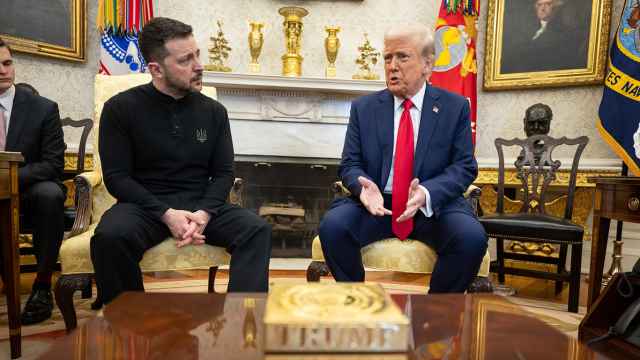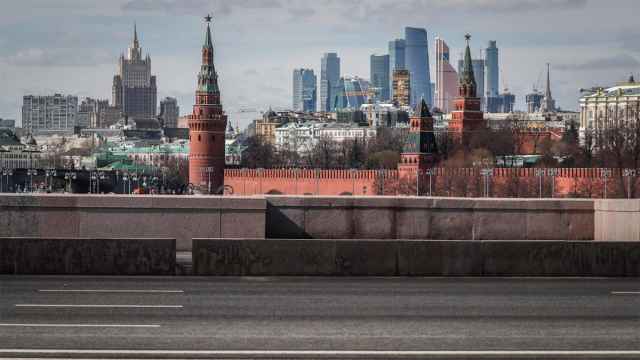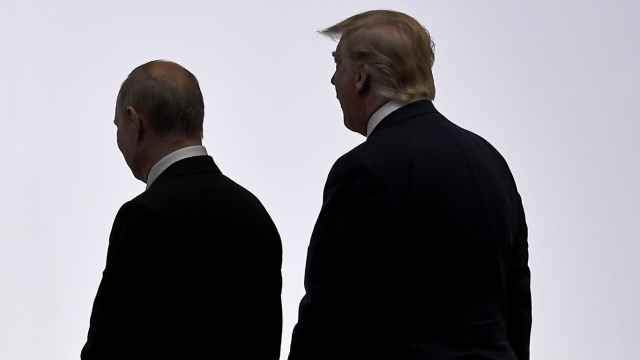(Bloomberg) — Reading Michael Wolff's "Fire and Fury" — last weekend's most-talked-about literary sensation — I came away with the distinct impression that Americans have it good. Here's a mental exercise: Try to imagine the "Wolffing" of Russian President Vladimir Putin.
The extent of Wolff's White House access is a matter of debate: There's not much in the book to indicate it was particularly extensive or effectively used. But Wolff's description of his modus operandi would make anyone planning a similar book on Putin's administration instantly jealous. He "took up something like a semi-permanent seat on a couch in the West Wing" as a "constant interloper," which allegedly enabled him not just to watch the comings and goings but to conduct 200 interviews with top presidential staff.
Wolff wrote that guests of the White House's West Wing would sometimes be left to "find their own way through the warren that was the Western world's pinnacle of power" — but the "warren" is, in reality, a small area on just two floors of a cramped building.
By contrast, what we call "the Kremlin" isn't really localized in the medieval fortress on the Moskva River. The presidential administration's most important departments are split between the Kremlin's Building 1 and the former site of the Soviet Communist Party's Central Committee on Staraya square, a short walk away from the Kremlin. The huge, labyrinthine Staraya complex is designed so that outsiders only go where they're meant to, and in Building 1 guards accompany a visitor even to the bathroom.
Unlike with the White House, there are no public floor plans. And observing the comings and goings or catching officials at vulnerable moments would be impossible even from the front room of Putin's Kremlin office: A lot of the work is conducted by secure high frequency telephone or from one of Putin's official residences, most frequently the one at Novo-Ogaryovo near Moscow, where Putin spends much more time than in his Kremlin office.
Apart from access, a "fly on the wall" would need the ability to be in multiple places at once — or, at the very least, to be where Putin is at any given moment (that would let the fly see some top administration officials without trying to track them down at Staraya or in the Kremlin). That would be tough, though: Unlike the U.S. administration, the Kremlin doesn't publish even an approximate presidential schedule.
As Oliver Stone found out with his "Putin Interviews," access to the Russian leader can yield gigabytes of boring, unrevealing, propaganda-laced video; like watching a black box from the outside.
The last time anyone was given any vaguely useful access to Putin, a group of journalists was allowed to write a book of interviews, "From the First Person," to be published during Putin's first presidential campaign in 2000. It's still the best source of material on Putin's character and his formative years. Putin can no longer be caught by surprise, provoked when he doesn't want to be, publicly angered unless the anger is calculated. After 18 years in power, his mask is part of him and he wears it comfortably.
Perhaps the closest Russia has come to "Fire and Fury" is Mikhail Zygar's "All the Kremlin's Men: Inside the Court of Vladimir Putin," published in Russian in 2015. Though it spans a much longer period than Wolff's book — from 1999 through 2015 — Zygar claims to have interviewed dozens of former and current officials who worked closely with Putin. There are some remarkable similarities between his work and Wolff's.
Somewhat like Wolff, Zygar describes his story as one "about a man who suddenly became king" and describes Putin's underlings as tasked with "guessing" what the boss really wanted. But he doesn't end up painting a picture of chaos or comical incompetence: His final image is that of a beehive-like collective intelligence:
"It's often thought that all decisions in Russia are made by one man — Vladimir Putin. That's only partly true. Think of Putin as an enormous collective mind. Dozens, even hundreds of people must guess daily what decisions Vladimir Putin would wish them to make. Vladimir Putin himself guesses all the time what decisions he must make to be popular, to be understood and approved of by this enormous collective Vladimir Putin".
Zygar may have presented Putin as a reactive leader rather than a strategist, but a "collective Putin" creates the impression of solidity, a system with strong roots and a working mind. That may explain why Zygar didn't get in trouble for a work that attempts to demystify Putin. Like Putin, people who have gotten close to him in the system he built are good at putting the right spin even on a story that, at first glance, looks neutral or negative.
Much of Wolff's book appears to be based on the journalist's conversations with Steve Bannon, the in-house ideologist of Trump's White House in the first months of the presidency. Now, of course, there is a public spat between Trump and Bannon, with Bannon offering half-hearted apologies. With Putin, that aspect of "wolffing" is impossible to imagine.
The direct Russian equivalent of Bannon — down to the personal sloppiness and the erudite verbosity — is Alexander Dugin, the Russian imperialist philosopher. At times, he and his disciples have been close to the Kremlin or used by it, but Dugin has never been allowed inside the power structure. Keeping him and others like him at arm's length has been part of the Kremlin's show of mainstream neutrality and its pragmatically cautious treatment of zealots.
The two men who have publicly claimed strong influence on the Kremlin's policies and then turned against Putin — the late Boris Berezovsky and political strategist Gleb Pavlovsky — only voiced their differences with the Russian ruler after falling out with him and losing any power they had, a circumstance that undermined their credibility compared with Bannon mouthing off from inside the Trump White House. Russians on the inside of the Putin system have far more to lose by not filtering what they say.
If Wolff's book makes Trump look eminently incompetent, his staff mutinous and incapable of meaningful work, the White House infighting comical and unworthy of the responsibility of governing a country such as the U.S., think of the impossibility of "wolffing" the Kremlin.
To me as a Russian, it's a huge source of jealousy that Trump's vulnerability and his top staffers' neuroses and frustrations are so readily on display, that a reporter can see and hear all these things by showing up at the seat of power without really being vetted or controlled.
A country as beautifully chaotic — true democracy is never orderly — as the U.S. should be able to endure some slapstick at the top as long as it's as transparent to the public as Wolff makes it.
Leonid Bershidsky is a Bloomberg View columnist. He was the founding editor of the Russian business daily Vedomosti and founded the opinion website Slon.ru. The views and opinions expressed in opinion pieces do not necessarily reflect the position of The Moscow Times.
A Message from The Moscow Times:
Dear readers,
We are facing unprecedented challenges. Russia's Prosecutor General's Office has designated The Moscow Times as an "undesirable" organization, criminalizing our work and putting our staff at risk of prosecution. This follows our earlier unjust labeling as a "foreign agent."
These actions are direct attempts to silence independent journalism in Russia. The authorities claim our work "discredits the decisions of the Russian leadership." We see things differently: we strive to provide accurate, unbiased reporting on Russia.
We, the journalists of The Moscow Times, refuse to be silenced. But to continue our work, we need your help.
Your support, no matter how small, makes a world of difference. If you can, please support us monthly starting from just $2. It's quick to set up, and every contribution makes a significant impact.
By supporting The Moscow Times, you're defending open, independent journalism in the face of repression. Thank you for standing with us.
Remind me later.








